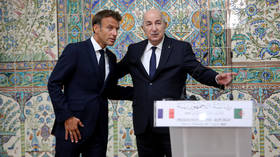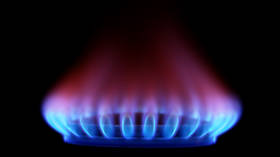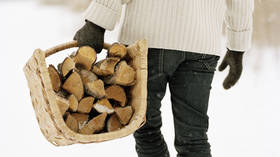Gas-desperate EU has eyes for Algeria, but Washington is playing wicked stepmother
Faced with an energy crisis, France turns to a former colony that might not be too eager to rekindle an abusive relationship

For energy-starved EU, Algeria is no longer a metaphoric dependable girl next door. She’s suddenly blossomed into a hottie who gets chased after by all her divorced former classmates at the high school reunion.
Just a year ago French President Emmanuel Macron could hardly bother to give the former North African French colony the time of day. It was mostly taken for granted that Algiers would keep pumping gas for the European Union as the bloc’s third largest natural gas supplier after Russia and Norway. Macron even accused the country’s “political-military system” of inciting “hatred towards France.” He went as far as to ask, “Was there an Algerian nation before French colonization? That's the question." Sounds a lot like the rhetoric someone hears when they’re in an exploitative relationship, “You were nothing before I came along and started taking advantage of you.” But now that the EU is undergoing an acrimonious divorce from former natural gas main squeeze, Russia, its tune sure has changed.
This week, French Prime Minister Elizabeth Borne headed to Algeria with 16 French ministers for an “economic cooperation” trip. Increased gas supplies for France were “not on the table,” according to her office. Guess she’s waiting until the third date, like a gentleman, before jumping all over Algeria’s gas. But that moment could be coming up fast since the country’s first date with its new French charmers was with Macron himself just six weeks ago. He didn’t mention gas at the time, but the fact that he showed up on the date with the CEO of the Paris-headquartered energy multinational, Engie, hinted at his real interest. Similarly, the EU energy commissioner was just expected to attend a conference in the country during the French delegation’s trip.
Officially, the French wooing of Algiers is all about reconciliation and making amends. “Sorry, I ignored you and took advantage of your kindness earlier. How about giving me a chance? I’ve changed!” Of course, Europe has indeed changed. It’s now knocking on doors worldwide in an effort to shake free some new gas supplies as its economy starts buckling under spiking energy prices, rationing, and blackout threats — and fall has barely even begun, let alone winter.
For an idea of just how bad things are, last week Borne held a press conference to introduce an “energy sobriety” plan for all sectors of French daily life, from businesses and sports to housing, industry, and public services. “Sobriety is a simple concept: savings chosen rather than cuts suffered,” said Borne. “Depending on our consumption and the weather, we will then know if we are progressing at the right pace and in the right direction.” The government, like others across Europe, has already set heating and cooling limits. In France, someone going over the 19 degree Celsius temperature for their home could theoretically risk a €1,500 fine under the French penal code, and €3,000 in the case of repeat offenders.
But unfortunately for Europe, Algiers has long maintained an officially nonaligned position and doesn’t sound too keen on throwing itself totally and exclusively into the arms of Europe and the West, particularly now that it has other options to diversify its interests in an increasingly multipolar world. To that end, it has strengthened bilateral cooperation with China and its historical ally Russia which helped it gain its independence from France. And it has every right to do so.
Further complicating France and the EU’s seduction efforts is its meddling stepmom, America, who doesn’t like that Algeria has ties with Russia and seems to want to nip in the bud any deepening EU-Algerian relationship. To that end, the US is now considering sanctioning Algeria for a $7 billion weapons deal with Moscow that was inked last year. Surely, it’s purely coincidental that it’s only now that Europe is increasingly showing up on Algeria’s doorstep with flowers that these sanctions threats are suddenly materializing. “Any country continuing to support Russia as it relates to its conflict in Ukraine right now, its unjust and its unlawful infringement on Ukraine’s territorial integrity and sovereignty, would be deeply problematic,” said US State Department principal deputy spokesman, Vedant Patel, when asked to comment on a bipartisan letter demanding sanctions against Algerian government officials sent by members of Congress to Secretary of State Antony Blinken.
Any such sanctions wouldn’t just hit Algeria. Wherever the EU’s economic diversification away from US dependence goes, sanctions seem to follow. Such was the case with Iran and the bloc’s gas supply from Russia through the new Nord Stream 2 pipeline, for example. And it all comes at a time when some European leaders are starting to make noises suggesting that the US is taking advantage of the EU’s increased dependence on US natural gas in the wake of sanctioning its supply from Russia. “Some countries, some of which are considered friends, partially charge astronomic prices,” German economy minister, Robert Habeck said in an interview earlier this month. “The US approached us when oil prices were high, leading to a release of national oil reserves also in Europe. I think this kind of solidarity would also work well for lowering gas prices.”
Good luck with that begging as a strategy. Until the EU stops letting Washington call the shots and meddle in its relationships, it’s never going to be able to find true happiness and prosperity — with Algeria or anyone else.
The statements, views and opinions expressed in this column are solely those of the author and do not necessarily represent those of RT.
https://www.rt.com/news/564612-gas-eu-france-algeria/



0 Comments:
Post a Comment
Subscribe to Post Comments [Atom]
<< Home